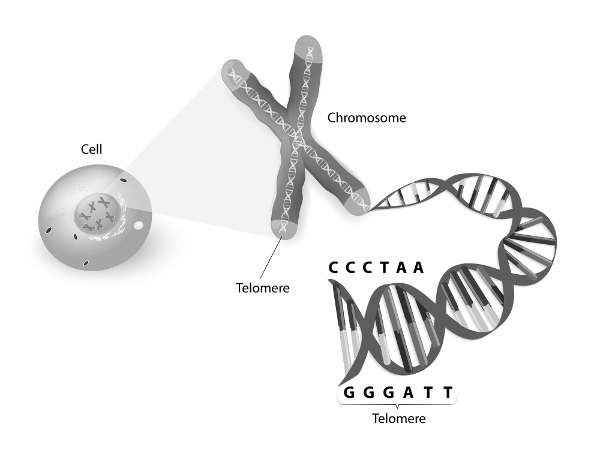A telomere is a region of repetitive DNA at the end of a chromosome. Telomeres protect the ends of a given chromosome’s DNA from deterioration (although the shortening of chromosome telomeres normally occurs during chromosome replication). All cells that make up tissue undergo some degree of turnover (replication and apoptosis, i.e. programmed cell death). Cells are more easily destroyed when their telomeres are shortened, compromised, or defective. Some cells have ways, however, of evading normal programmed destruction and replacement. During replication, telomeres lose some of their genetic material but are repaired by an enzyme, telomerase. Some cancer cells maintain their telomeres and become so-called “immortalized” because of differences in telomere maintenance or the relative expression of telomerase levels.
Likewise, mitochondrial integrity is linked to apoptosis. There is little evidence, however, that directly links telomere integrity and telomerase activity to mitochondriogenesis or mitochondrial turnover. Telomere truncation and a reduction in cellular mitochondria, both contribute to apoptosis, but by separate, although coordinated by independent processes. Longer-lived cells often have more mitochondria.

With regard to PQQ, to the extent that pyrroloquinoline quinone can stimulate mitochondriogenesis, then one may speculate that PQQ may slow aging. If true, a likely mechanism is better control of maintaining reactive oxygen species (ROS), which can affect many aspects of cellular activity.
Does PQQ affect telomeres‘ integrity?
This question has not been specifically examined, but in one large gene array experiment using a rodent model (Biochem J. [2010] 429:515-26), no specific modulation of telomere-related proteins were detected. Mitochondria-related ROS modulation, however, might have an indirect effect.
With regard to Coenzyme Q or ubiquinone, the primary effect is on the electron transport chain and aerobic cellular respiration. Ninety-five percent of the human body’s energy is generated this way and involves CoQ10. Tissues with high energy requirements usually have higher CoQ10 concentrations. It has been shown levels of CoQ10 seem to correlate with ROS production. Low dosages of CoQ10 reduce cellular ROS levels and DNA double-strand breaks (note – a different process than telomere maintenance). With this said, however, CoQ10 supplementation only has been associated with increased lifespan in mice or rats with very mixed results. The take-home message here is that for a defined response, if an organism has enough of a given substance taking more (of that substance) may not have an effect (and in some cases have an adverse effect).
With regard to “feeling” better or worst in response to a supplement or change in a diet or activity – the answer is always a relative one. It is always important to ask – what are the thresholds that I am trying to achieve? If it is protection from disease or optimizing cellular maintenance, you may not know the answer until the end of life. Sometimes the best we can do is infer that the effects will be positive based on the scientific data available at the time.

How does one write directly to the publisher of this website (outside of leaving comments here)? I’d like to know what credible sources of scientific research you’re referencing.
Hi Marley, currently the PQQ comments section is the best way to communicate with us. It serves our visitors better by keeping ongoing discussions public. If you are simply looking for more peer-reviewed research on methoxatin, and you can’t find what you are looking for on this site you might try Google’s beta research search engine Google Scholar. If you have any specific questions, we’ll try our best to answer them for you here.
How does PQQ affect actively growing lung adenocarcinoma or other tumors? Would it increase or decrease cell division? Would it cause apoptosis of cancer cells or would it hasten cancer growth or even precipitate uncontrolled spread?
Hi Anne, regrettably there are no current data points on the influence of PQQ using cancer cell lines in vitro or experimental cancer models in vivo. There are some positive effects (decreases in tumor promotion) that have been observed in animal models using compounds that behave biologically and mechanistically similar to pyrroloquinoline quinone (ex. resveratrol). Check out PubMed and use resveratrol and cancer as keywords to learn more about this compound. There is always a concern here , which I think is what you are trying to drill down in to, that many compounds that seem to have healthful or… Read more »
Has anyone done a long term test of PQQ on any animals to find out what effect it had on lifespan?
To date there have been no papers using any type of whole organisms that address whether or not pyrroloquinoline quinone has an independent or direct influence on aging (regarding both animals and humans). All of the work linking PQQ to aging is inferential and is based on PQQ’s ability to optimize mitochondrial function.
PQQ is amazing! I take 10 milligrams at 8am and also at noon. I benefit from improved mood, concentration, focus, stamina. even my complexion has improved.
Professor Rucker, the effect of PQQ on lifespan of animals is an attractive issue. I’m now using an model animal to study this project. Wish to get some interesting results and share with worldwide PQQ fellows in 2012.
Hi Wesley, we look forward to hearing about your results! Thanks for visiting our site.
I have been researching PQQ lately, and read about the positive results in animal studies regarding relative avoidance of ischemic reperfusion injury following induced stroke in lab animals. This was due, I understand, to PQQ’a ability to “block nitric oxide synthase”. This immediately begs the question, can pyrroloquinoline quinone cause male erectile dysfunction since normal function depends on adequate levels of nitric oxide? Thanks, Jack